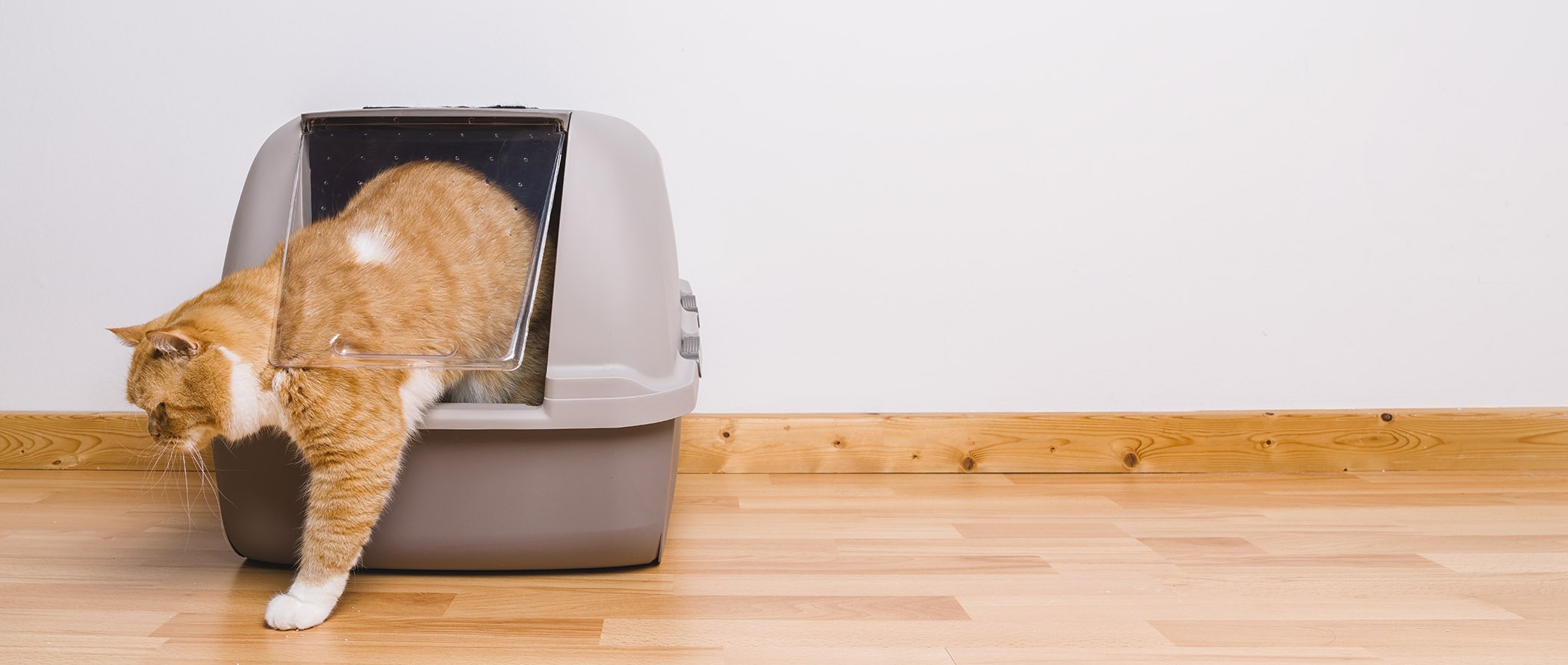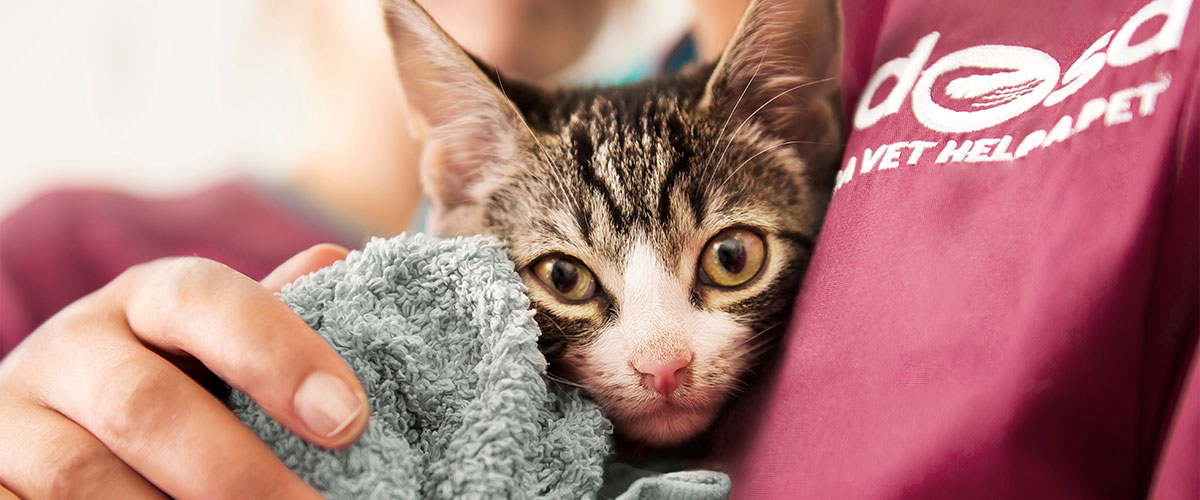Feline Idiopathic Cystitis (FIC)
Overview
- Feline Idiopathic Cystitis is the most common type of cystitis we see in cats and while we don’t fully understand what causes it, we do know it’s usually triggered by stress.
- Once a cat has developed FIC they are likely to remain prone to symptom flare-ups and require ongoing management throughout their life.
- Although most cats with FIC can be well controlled with treatment, some are much trickier to manage.
- Left untreated, FIC can lead to severe, life-threatening complications such as a blocked bladder.
- If you notice your cat showing symptoms of cystitis, contact your vet as soon as possible.
- If you notice your cat straining and repeatedly trying to pee, but not passing any urine, this is an emergency – contact your vet immediately for an emergency appointment.

‘Feline Idiopathic Cystitis/FIC’ is the most common type of cystitis (inflammation of the bladder) in cats. While the exact cause isn’t fully understood, we do know that it’s usually triggered by stress - similar to humans that suffer from recurring tummy problems due to stress, some cats suffer from recurring bladder problems due to stress. Common triggers include:
- Moving house
- Conflict with other cat(s) – this includes cats living in the same house
- Arguments/tension between people in the home
- New baby/pets/other people in the home
- DIY/home renovations
- Furniture rearranging
- A change of food
- Changes in weather
- Insufficient resources for each cat (water bowls, litter trays, food bowls, beds and hiding places)
How does FIC develop?
When a healthy cat experiences stress, their body produces stress chemicals to help them cope. However, when a cat with FIC experiences stress, their body produces excessive amounts of certain stress chemicals, and not enough of others – making them less able to cope. One effect of this chemical imbalance is that the bladder’s protective lining becomes patchy, and the bladder wall becomes inflamed and painful because it’s no longer protected from urine (which can be very irritating). If the inflammation becomes very severe, it can result in a build-up of mucus and crystals in the urine, which can block the urethra (the tube that carries urine from the bladder out of the body), causing a life-threatening condition called a blocked bladder.
Although FIC can affect any cat, it appears to be most common in:
- Males
- Neutered cats
- Indoor cats
- Overweight cats
- Cats that don’t do much exercise
- Cats that live with other cats
Symptoms
Symptoms of FIC include:
- Pain when peeing – your cat might strain or cry while they pee, then quickly turn to clean their private parts afterwards
- Very frequent litter tray use
- Bloody urine – this can look red, pink, or sometimes a brown colour
- Peeing outside of the litter tray – it’s common for this to be in the bath, sink or on cold hard floors
- Excessively grooming – usually the tummy and between the back legs
- Restlessness/meowing around the litter tray
- Being unable to pee – this is a life-threatening emergency, if your cat is repeatedly visiting their litter tray and not passing anything (check their litter) - contact your vet immediately
Diagnosis
To diagnose FIC, your vet will first need to rule out some other possible causes such as infection of the bladder and bladder stones. Your vet will examine your cat, ask you some questions about their lifestyle, and probably run some blood and urine tests. They may also need to take some X-rays or an ultrasound scan of your cat’s bladder. If nothing is found, and their symptoms point towards FIC, then it’s likely that FIC is the problem.
Treatment
In the short term, your cat will need medication to control their FIC symptoms, but by far the best way to prevent them from having symptom flare-ups is by making some simple changes at home to reduce their stress levels. These changes might seem minor to you but could make a huge difference to the way your cat feels. Your cat’s management plan is likely to include some of the following:
Anti-inflammatory painkillers (NSAids) – used in the short-term to help reduce pain and settle bladder inflammation*.
*Never give your cat anything that hasn’t been prescribed by your vet, and always contact your vet before giving your cat medication, even if it was prescribed to them previously for similar symptoms.
Increase drinking – the more water your cat drinks, the more diluted and less irritating their urine will be when it comes into contact with their bladder wall. Drinking more will also help flush out any mucus and crystals in their bladder. A few ways to increase your cat’s water intake include:
- Add water to their food (both wet and dry), but if they don’t like this and won’t eat it, simply offer them significantly more wet food than biscuits, or even cut biscuits out altogether (if your cat will still eat enough).
- Place several water bowls around your home - enough so your cat can always use one whenever they want to. Put them in quiet areas of the house, away from their food, and try to use low-sided, glass, or ceramic bowls.
- Provide them with a pet water fountain - some cats prefer to drink moving water.
- Allow them to drink from dripping taps if they want to.
Prescription food – if your cat has regular flare-ups of FIC symptoms, your vet might recommend a special diet designed to protect their bladder.
Reduce stress – cats with FIC tend to be much less able to cope with stress, and often become very anxious over things that seem minor to other cats. Worst of all, they might not show obvious signs of their stress, making it very difficult for you to pick up on how they are feeling. One of the best ways to manage FIC is by making some really simple changes at home to help your cat feel calm:
- Dedicate time to play with them every day - but only if they enjoy it.
- Use calming pheromone diffusers and sprays around your home.
- Try oral calming supplements.
- Give them enough ‘resources’ – cats don’t like sharing and need their own things to feel happy and calm. Make sure they have enough:
- Beds and hiding places – put them in various places around your home, making sure some are up high, away from other cats and people in your household.
- Food bowls – make sure they have their own, somewhere quiet, away from any other cats.
- Litter trays – they need at least two, even if they go outside. Each tray should be in a different location around your home, somewhere they won’t be bullied by the other cats. If you have more than one cat, provide at least one tray per cat, plus one extra e.g. two cats need at least three trays, three cats need at least four.
- Stick to a routine – cats tend to get very anxious if their routine changes. Try to stick to regular feeding times, even when you’re away, and ask someone to feed them at their usual time.
- Avoid catteries – if you are going on holiday, avoid taking them to a cattery as this is likely to be extremely stressful. Instead, ask someone to house-sit for you, or come in a couple of times a day to feed and sit with them.
- Winter adjustments –the change in weather can be stressful for cats because they won’t want to go outside as much. You’ll just need to clean their litter a bit more regularly and spend a little more time playing with them to keep them happy.
- Want more info? Read our guide on how to recognise and reduce stress in cats.
Diet and exercise – overweight, lazy cats are much more likely to develop FIC so it’s important to keep your cat slim and fit. For more information read our guides Your Cat’s Diet & Exercising your Cat
Bladder supplements – can help to soothe and supplement the bladder lining. However, it’s important to keep in mind that although bladder supplements may help some cats, there is no scientific proof to show that they help every cat with FIC. It’s best to speak to your vet before starting them.
 Video found at youtu.be/jZDtskjwdpM
Video found at youtu.be/jZDtskjwdpM
Outlook
Most cats with FIC can live a long, happy life as long as they receive the right medication and care at home to control their symptoms. Most will have flare-ups of their symptoms from time to time, but these can usually be controlled with medication from your vet. If your cat’s symptoms don’t improve, keep returning, or get worse at any point, speak to your vet for advice. Your cat may need further investigations or a different treatment plan.
When to contact your vet
- If you notice a change in your cat’s peeing habits contact your vet for advice as soon as possible.
- Contact your vet immediately if your cat is straining to wee but not passing any urine - this could be the symptoms of a blocked bladder which is a life-threatening emergency.
Cost
Treatment for FIC can become expensive, especially because it’s a lifelong condition. It can even require hospitalisation if it leads to complications such as a blocked bladder. Speak to your vet if you can’t afford the treatment they have recommended, there may be other options.
Consider taking out Cat Insurance as soon as you bring your cat home, before any signs of illness start. This will give you peace of mind that you have some financial support if they ever become unwell.
Published: January 2023
Did you find this page useful?
Tell us more
Please note, our vets and nurses are unable to respond to questions via this form. If you are concerned about your pet’s health, please contact your vet directly.
Thank you for your feedback
Want to hear more about PDSA and get pet care tips from our vet experts?
Sign up to our e-newsletter
Written by vets and vet nurses. This advice is for UK pets only. Illustrations by Samantha Elmhurst.

